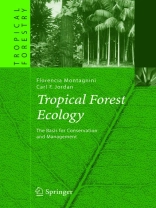Research in tropical forestry is confronted with the task of finding strategies to alleviate pressure on remaining forests, and techniques to enhance forest regeneration and restore abandoned lands, using productive alternatives that can be attractive to local human populations. In addition, sustainable forestry in tropical countries must be supported by adequate policies to promote and maintain specific activities at local and regional scales.
Here, a multi-disciplinary approach is presented, to better the understanding of tropical forest ecology, as a necessary step in developing adequate strategies for conservation and management. The authors have long experience in both academic and practical matters related to tropical forest ecology and management.
विषयसूची
Importance of Tropical Forests.- Characteristics of Tropical Forests.- Classification of Tropical Forests.- Deforestation in the Tropics.- Management of Tropical Forests.- Plantations and Agroforestry Systems.- Approaches for Implementing Sustainable Management Techniques.- Conclusions.
लेखक के बारे में
Florencia Montagnini
Dr. Florencia Montagnini is a Professor in the Practice of Tropical Forestry at Yale University School of Forestry and Environmental Studies. Her research focuses on variables controlling the sustainability of managed ecosystems (e.g., primary and secondary forests, plantations and agroforestry systems) in the tropics, with special emphasis on Latin America. Born in Argentina, she has a BS in Agronomy from the National University of Rosario, Argentina, a Masters degree in Ecology from the Venezuelan Institute for Scientific Research (IVIC) and a Ph.D. in Ecology from the University of Georgia, USA. She has studied and worked extensively in the U.S. and throughout Latin America, and operates in collaboration with local institutions such as CATIE (Tropical Agriculture Research and Higher Education Center, Costa Rica). She is currently conducting research in Costa Rica, Panama, El Salvador, Guatemala, Nicaragua, Argentina and Brazil, on sustainable systems for restoration of degraded ecosystems.
As Director of the Program in Tropical Forestry of the Yale Global Institute of Sustainable Forestry, some of the current projects that Dr. Montagnini is conducting include examining the role of native tree species in plantations and agroforestry ecosystems in reclaiming degraded areas with species of economic value; the identification and quantification of ecological services provided by forests (biodiversity conservation, carbon fixing and storage); reforestation of degraded lands with native species, including mixed-species designs; and tropical plantation silviculture. Her research integrates ecological principles with economic, social, and policy factors in the design of sustainable land use schemes in tropical regions.
As a scientist dedicated to education in tropical ecology, restoration, and agroforestry, she teaches several courses including, Tropical Forest Ecology and Management, Agroforestry Systems, Introductionto Soil Science, and Forest Landscape Restoration. She also advises Masters and Doctoral students in the study of tropical forestry and agroforestry systems.
Carl F. Jordan
Dr. Carl Jordan began his professional career with the U.S. Atomic Energy Commission (Now Dept. of Energy) studying radioisotope movement in the rain forest of Puerto Rico in the 1960s, when radioactive fallout was a major global concern. In 1969, he moved to Argonne National Laboratory and continued studies of radioactivity, this time from reactor effluent. In 1974, he joined the Institute of Ecology, University of Georgia, and for ten years led a major study of the structure and function of rain forests in the Amazon Territory of Venezuela. Together with scientists from the Venezuelan National Laboratory and the Max Planck Institute in Germany, over 100 peer-reviewed papers were published, and a summary volume was put out by UNESCO. In the 1980s, he expanded his tropical horizons with research projects and students in the tropical forests Brazil, Ecuador, Venezuela, Costa Rica, Guatemala, Mexico, Thailand, The Philippines, and China (Yunnan Province). A main focus of his work and those of his students was the impact of forestry and agriculture on tropical forests. Notable studies included the Jari pulp project and the Carajás development project, both in the eastern Amazon region of Brazil, an evaluation of the ‘Movement of People without Land’ (MST) movement in Pernambuco, Brazil, an evaluation of Participatory Action Research in Altimira Brazil, and reforestation by the ‘Forest Village System’ in Northern Thailand.
In the mid-nineties, Jordan phased out his tropical work, and began to apply many of the principles learned in the tropics to an organic farm in the Piedmont Region of Georgia, where soils and climate are similar to those in many rain forest regions (red ultisols, 8 months per year of hot, wet climate, 4 months of dormancy). Of particular interest isdevelopment of ‘tropical style’ alley cropping (leguminous hedge-rows with economic crops in the ‘alley’ between the hedges).
As a tropical ecologist, he finds an intriguing question in his new work in the U.S.: ‘Why are there so few species in extra-tropical latitudes?’












